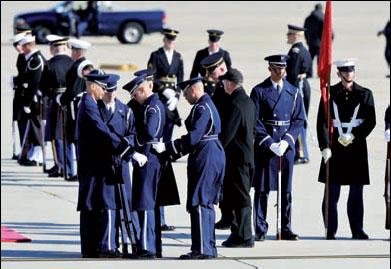Media coverage wide-ranging
Updated: 2012-02-15 15:40
By Chen Weihua (China Daily)
|
||||||||
|
Troops prepare before a full honors ceremony in the honor of Chinese Vice-President Xi Jinping on Tuesday. [Mao Jianjun / China News Service] |
NEW YORK - With the Republican primaries raging on, the death of Whitney Houston and United States President Barack Obama submitting his 2013 budget to Congress on Monday, there has been plenty of news to compete for attention. Yet the visit by Vice-President Xi Jinping made major headlines in the US on Monday.
USA Today, the newspaper with the largest circulation in the US, placed the coverage of Xi's visit in a prominent position on its website and was constantly updated. One headline said: "Obama works to build important relationship with China".
On The New York Times website, stories about Xi's visit were also displayed in a top spot and updated multiple times about his busy schedule on Monday, in addition to its usual coverage on other subjects related to China.
The Washington Post website started covering the visit days before Xi's arrival in Washington. But once he arrived, reports mostly focused on political and human rights issues instead of economy or trade.
The CBS report by its White House correspondent, Bill Plante, touched on the China-bashing rhetoric in Washington, especially from the Republican presidential candidates. But he also noted that Xi will be welcomed in Iowa because Iowa emphasizes trade and Iowa's trade with China is soaring.
Andrew Billo, senior program officer at the New York-based Asia Society, said the US media tends to focus too much on the negative side of the China-US relationship.
Billo said he believes that job creation and economic growth, the fundamental interest of the two countries, should be the main focus.
"Even on the South China Sea, the US pivotal interest there should be economic interest and not military interest," he said.
While the media tend to shout the negatives of the China-US relationship, Sebastian Mallaby, director of the Maurice R. Greenberg Center for Geoeconomic Studies at the Council on Foreign Relations, offers his proposals to solve the thorny issues, which have been much of the media coverage.
According to Mallaby, there are two kinds of economic and trade tensions with China. One is specifically with trade and the other is currency. He said while these tensions could lead to suspicion and counter-suspicion, the US must break that cycle.
Noting that some of the disputes are going to be inevitable, Mallaby suggests the US should have initiatives that are encouraging, such as trying to attract more Chinese companies to invest in this country that will create jobs in this country.
"That's something Chinese say they like it. Why not embrace that and say, 'Yes, you will be welcomed here to put your money in a long-term way and help our economy,' " Mallaby said.
Chinese FDI is "absolutely a good and positive thing. If China invests in the United States, it would divest from holding US Treasury bonds. It's good for both China and the US," he said.
Mallaby also said the US should encourage the Chinese government's ambitions of making its currency, renminbi, into a reserve currency.
"It is a good thing. It would encourage a lot of reforms in China, such as in the banking system, exchange rate and capital control," he said.
However, he admitted that many Americans may be scared by this notion of China's currency challenging the status of the US dollar.
"As a political argument, people may be scared. But I am talking about an intelligent argument," Mallaby said.
China Daily

 Relief reaches isolated village
Relief reaches isolated village
 Rainfall poses new threats to quake-hit region
Rainfall poses new threats to quake-hit region
 Funerals begin for Boston bombing victims
Funerals begin for Boston bombing victims
 Quake takeaway from China's Air Force
Quake takeaway from China's Air Force
 Obama celebrates young inventors at science fair
Obama celebrates young inventors at science fair
 Earth Day marked around the world
Earth Day marked around the world
 Volunteer team helping students find sense of normalcy
Volunteer team helping students find sense of normalcy
 Ethnic groups quick to join rescue efforts
Ethnic groups quick to join rescue efforts
Most Viewed
Editor's Picks

|

|

|

|

|

|
Today's Top News
Health new priority for quake zone
Xi meets US top military officer
Japan's boats driven out of Diaoyu
China mulls online shopping legislation
Bird flu death toll rises to 22
Putin appoints new ambassador to China
Japanese ships blocked from Diaoyu Islands
Inspired by Guan, more Chinese pick up golf
US Weekly

|

|







